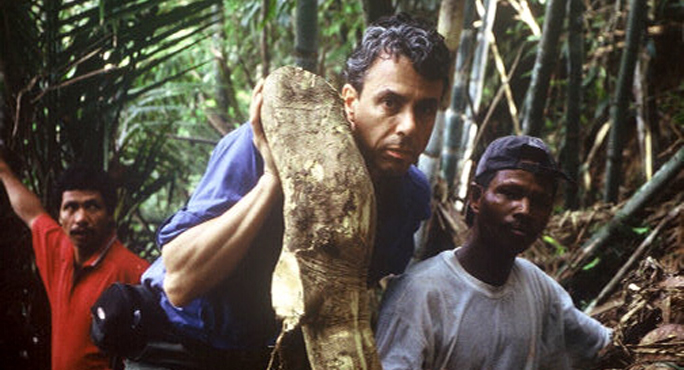Chris Kilham and local harvesters and Tongkat Ali root, Malaysia
While women undergo menopause, it appears that middle-aged men also experience their own very significant period of change called andropause – sometimes referred to as man-o-pause.
Andropause is caused by a steady decline in two valuable hormones: testosterone and dehydroepiandrosterone (DHEA). As these hormones decline, things indeed change. Though symptoms vary from one man to another, andropause can result in lower libido, erectile dysfunction, sleep disorders, fatigue, loss of mental sharpness and an inverse change in the ratio of lean muscle to fat.
Andropause is also referred to as partial androgen deficiency in aging males (PADAM). An androgen is any hormone that helps in the development and maintenance of male characteristics, including secondary sex characteristics. These include the growth of body hair, muscle mass and strength, growth of the penis and testicles, sperm production, broadening of the chest and enlargement of the voice box.
Starting at age 30, the body’s levels of testosterone decline by approximately 1 percent every year. Thus by age 50 or so, a man may have lost a full 20 percent of his total testosterone.
While this can have physical, mental and emotional effects, it does not mean that a man’s reproductive capacity suffers. Unlike women, men can usually still father children even into advanced age.
Men who work in pharmaceutical labs, work with agricultural pesticides or who are in regular contact with industrial chemicals are known to experience greater decline in androgens than other men.
The loss of testosterone, which is more widely studied than the loss of DHEA, is typically experienced as a loss of youthful vitality. The resulting inverse ratio of lean muscle to fat means that formerly well-developed muscle tissue is reduced and fat increases. These are classic signs of what most people consider the normal aging process.
But the question is, does this have to happen?
We now know that regular exercise, especially vigorous exercise, can help people maintain a higher level of sex hormones longer and later in life. Exercise also enhances overall energy, circulation and cardiovascular health and improves mental well being.
But now a couple of significant studies out of Malaysia show that an herb from that region can also boost the body’s natural production of testosterone later in life, thus counteracting PADAM. Dr. Ishmael Tamby, a reproductive specialist in Kuala Lumpur, has studied the use of a Malaysian rainforest herb called Tongkat Ali (Eurycoma longifolia), and its effects on men.
Tamby's study was conducted by selecting thirty adult males of various ages, assessing their testosterone levels and then administering 100 milligrams of Tongkat Ali extract to test subjects daily.
The researchers discovered that the testosterone levels of all subjects rose, resulting in a reported 73 percent improvement in sexual function, a 91 percent improvement in libido and an 82 percent psychological improvement relative to sex compared to the control group.
In a recent study of a similar type, administration of Tongkat Ali resulted in a 47 percent improvement in DHEA levels.
While taking testosterone drugs can be risky due to unwanted side effects including nausea, vomiting, acne, changes in skin color and pain, no such negative effects have been reported with Tongkat Ali. This is because the herb does not contain any testosterone, but instead triggers the body’s own natural capacity to create the hormone.
In the studies conducted by Tamby and others, daily supplementary use of Tongkat Ali extract results in a feeling of youthful vigor. Malaysian athletes use the herb to maintain physical strength and lean muscle. Both men and women who take Tongkat Ali experience a boost in libido.


